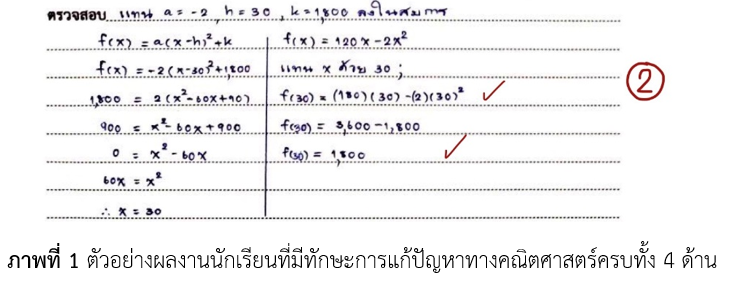ผลของการจัดกิจกรรมการเรียนรู้คณิตศาสตร์ตามแนวคิดแบบฮิวริสติกส์ร่วมกับการใช้คำถามระดับสูงที่มีต่อความสามารถในการแก้ปัญหาทางคณิตศาสตร์ ของนักเรียนชั้นมัธยมศึกษาปีที่ 5
Main Article Content
บทคัดย่อ
การวิจัยครั้งนี้มีจุดประสงค์ 1) เพื่อพัฒนาแผนการจัดการเรียนรู้โดยใช้แนวคิดแบบฮิวริสติกส์ร่วมกับการใช้คำถามระดับสูง เพื่อส่งเสริมความสามารถในการแก้ปัญหาทางคณิตศาสตร์ เรื่อง ฟังก์ชัน ให้มีประสิทธิภาพตามเกณฑ์ 70/70 2) เพื่อเปรียบเทียบความสามารถในการแก้ปัญหาทางคณิตศาสตร์ เรื่อง ฟังก์ชัน หลังการจัดการเรียนรู้ตามแนวคิดแบบฮิว
ริสติกส์ร่วมกับการใช้คำถามระดับสูง กับเกณฑ์ร้อยละ 70 3) เพื่อเปรียบเทียบผลสัมฤทธิ์ทางการเรียน เรื่อง ฟังก์ชัน หลังการจัดการเรียนรู้ตามแนวคิดแบบฮิวริสติกส์ร่วมกับการใช้คำถามระดับสูง กับเกณฑ์ร้อยละ 70 กลุ่มตัวอย่างที่ใช้ในการวิจัยในครั้งนี้เป็นนักเรียนชั้นมัธยมศึกษาปีที่ 5 ภาคเรียนที่ 2 ปีการศึกษา 2564 โรงเรียนร้อยเอ็ดวิทยาลัย จำนวน 36 คน ได้โดยการสุ่มแบบกลุ่ม โดยแต่ละห้องเรียนจัดการเรียนรู้แบบคละความสามารถ เครื่องมือที่ใช้ในการวิจัยประกอบด้วย 1) แผนจัดการเรียนรู้ตามแนวคิดแบบฮิวริสติกส์ร่วมกับการใช้คำถามระดับสูง เรื่องฟังก์ชัน จำนวน 8 แผน 2) แบบทดสอบวัดความสามารถในการแก้ปัญหาทางคณิตศาสตร์ เรื่อง ฟังก์ชัน อัตนัยแบบเขียนตอบ จำนวน 5 ข้อ 3) แบบทดสอบวัดผลสัมฤทธิ์ทางการเรียนคณิตศาสตร์ เรื่อง ฟังก์ชัน ปรนัยแบบเลือกตอบ 4 ตัวเลือก จำนวน 20 ข้อ สถิติที่ใช้ในการวิจัยได้แก่ ร้อยละ ค่าเฉลี่ย ส่วนเบี่ยงเบนมาตรฐาน ทดสอบสมมติฐานโดยใช้ t – test for one sample ผลการวิจัยปรากฏดังนี้ 1) แผนการจัดการเรียนรู้ตามแนวคิดแบบฮิวริสติกส์ร่วมกับการใช้คำถามระดับสูง ที่ส่งเสริมความสามารถในการแก้ปัญหาทางคณิตศาสตร์ เรื่อง ฟังก์ชัน ที่ผู้วิจัยสร้างขึ้นมีประสิทธิภาพเท่ากับ 86.72/82.45 เป็นไปตามที่กำหนดไว้คือ 70/70 2) การแก้ปัญหาทางคณิตศาสตร์ เรื่อง ฟังก์ชัน หลังเรียนด้วยกิจกรรมการเรียนรู้ตามแนวคิดแบบฮิวริสติกส์ร่วมกับการใช้คำถามระดับสูง สูงกว่าเกณฑ์ร้อยละ 70 อย่างมีนัยสำคัญทางสถิติที่ระดับ .05 3) ผลสัมฤทธิ์ทางการเรียน เรื่อง ฟังก์ชัน หลังเรียนด้วยกิจกรรมการเรียนรู้ตามแนวคิดแบบฮิวริสติกส์ร่วมกับการใช้คำถามระดับสูง สูงกว่าเกณฑ์ร้อยละ 70 อย่างมีนัยสำคัญทางสถิติที่ระดับ .05
Article Details

อนุญาตภายใต้เงื่อนไข Creative Commons Attribution-NonCommercial-NoDerivatives 4.0 International License.
วารสารวิทยาศาสตร์และวิทยาศาสตร์ศึกษา (JSSE) เป็นผู้ถือลิสิทธิ์บทความทุกบทความที่เผยแพร่ใน JSSE นี้ ทั้งนี้ ผู้เขียนจะต้องส่งแบบโอนลิขสิทธิ์บทความฉบับที่มีรายมือชื่อของผู้เขียนหลักหรือผู้ที่ได้รับมอบอำนาจแทนผู้เขียนทุกนให้กับ JSSE ก่อนที่บทความจะมีการเผยแพร่ผ่านเว็บไซต์ของวารสาร
แบบโอนลิขสิทธิ์บทความ (Copyright Transfer Form)
ทางวารสาร JSSE ได้กำหนดให้มีการกรอกแบบโอนลิขสิทธิ์บทความให้ครบถ้วนและส่งมายังกองบรรณาธิการในข้อมูลเสริม (supplementary data) พร้อมกับนิพนธ์ต้นฉบับ (manuscript) ที่ส่งมาขอรับการตีพิมพ์ ทั้งนี้ ผู้เขียนหลัก (corresponding authors) หรือผู้รับมอบอำนาจ (ในฐานะตัวแทนของผู้เขียนทุกคน) สามารถดำเนินการโอนลิขสิทธิ์บทความแทนผู้เขียนทั้งหมดได้ ซึ่งสามารถอัพโหลดไฟล์บทความต้นฉบับ (Manuscript) และไฟล์แบบโอนลิขสิทธิ์บทความ (Copyright Transfer Form) ในเมนู “Upload Submission” ดังนี้
1. อัพโหลดไฟล์บทความต้นฉบับ (Manuscript) ในเมนูย่อย Article Component > Article Text
2. อัพโหลดไฟล์แบบโอนลิขสิทธิ์บทความ (Copyright Transfer Form) ในเมนูย่อย Article Component > Other
ดาวน์โหลด ไฟล์แบบโอนลิขสิทธิ์บทความ (Copyright Transfer Form)
เอกสารอ้างอิง
Academic Roi Et Wittayalai School. (2021). The Report O-Net Test for Mathematics of Mathayomsuksa 6 Students (in Thai). Roi Et: Roi Et Wittayalai School.
Angganapattarakajorn, V. (2012). The Mathematics School Teachers Should Know (in Thai). Bangkok: Charansanitwong Printing.
Boonprajak, S. (2007). Developing Mathematical Potential of Mathayomsuksa 1 Students Using Cooperative Learning (in Thai). Doctoral Dissertation. Bangkok: Srinakarinwirot University.
Brandt, R. (1984). Teaching of thinking, for thinking, about thinking. Educational Leadership, 42(1), 3-12.
Dechakup, P. (2001). Student-centered learning: Concept Method and Teaching Technique 1 (in Thai). Bangkok: The Master Group Management.
Garnett, K. F., and Bullock, J. T. (1991). Developing Problem-Solving Heuristics in the Middle School: A Qualitative Study. Research in Middle Level Education, 15(1), 83-103.
Meesuk, R. (2013). The Effects of Learning Emphasized Heuristics Thinking on Mathematical Achievement, Problem Solving and Reasoning Abilities on Polynomial Fractions of Mathayomsuksa 3 Students (in Thai). Master’s Thesis. Bangkok: Srinakharinwirot University.
Nakuma, T. and Ruannakan, P. (2018). Comparisons of Learning Achievement, Analytical Thinking, and Achievement Motivation of Third Grade Students toward to Mathematics Learning Management with Parabora content between Learning Management Heuristic and Normal Method (in Thai). Journal of Educational Measurement Mahasarakham University, 23(2), 85-93.
Nawapan, N. (2009). Effects of Organizing Mathematics Learning Activities Emphasizing Heuristics Thinking on Mathematical Creativity and Problem Posing and Solving Ability of Seventh Grade Students (in Thai). Master’s Thesis. Bangkok: Chulalongkorn University.
Rosemary Schmalz, S.P. (1973). Categorization of Questions that Mathematics Teachers ask. Mathematics Teacher, 66(7), 619-626.
Sheffield, L. J. (2003). Extending the challenge in Mathematics. Developing Mathematical Promise in K – 8 pupils. Retrieved 16 July 2021, from GoToKnow: http://www.sagepub.com/upmdata/7203_sheffield_ch1.pdf
Srisaard, B. (2013). Fundamental Research (9th ed) (in Thai). Bangkok: Suweeriyasarn.
The Institute for the Promotion of Teaching Science and Technology (IPST). (2012). Mathematical thinking process skills (3rd ed) (in Thai). Bangkok: 3Q Media.
Worakham, P. (2018). Education research (9th ed) (in Thai). Mahasarakham: Taksila.
Yen, F., and Flora, B. (1985). An intervention study in mathematical problem solving Among selected junior high school students (heuristics math tutoring self efficacy). Retrieved 16 July 2021, from GoToKnow: http://thailis.uni.net.th/dao/detail.nsp


